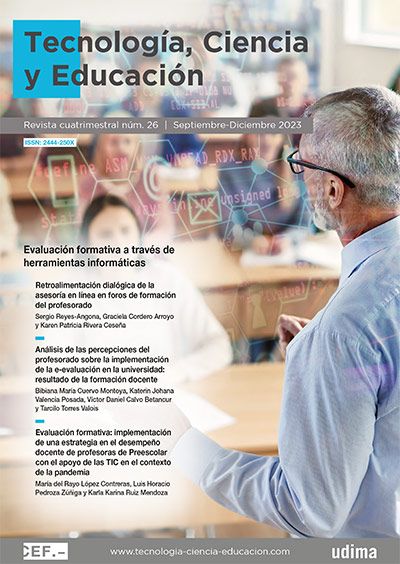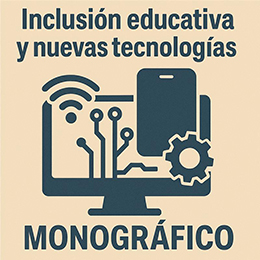Analysis of teachers' perception on the implementation of e-assessment at the university: teacher' training outcome
DOI:
https://doi.org/10.51302/tce.2023.18723Keywords:
e-assessment, higher education, technology tools, learning, teacher training, assessment learning, teaching strategiesAbstract
Learning assessment is a fundamental part of any training proposal, particularly in higher education. An attractive methodology that aims for this purpose is e-assessment; being key in teaching and learning environments mediated by information and communication technologies (ICT). The study aimed to describe the perceptions of teachers (men and women) about the relevance of the implementation of e-assessment in their training courses at the university. For this, a cross-sectional descriptive observational study was carried out on teachers from the University of Antioquia who had participated in e-evaluation training courses. The sample consisted of 154 teachers who took the e-evaluation course between the periods 2019 and 2022. For the collection of information, an ad hoc instrument (Alsaadoun, 2022) was adapted and systematized to identify the observable variables that made up the latent variables of «Teaching» and «Learning». The results showed a high reliability of the instrument, with an omega coefficient of 0.88 and 0.92 for the «Teaching» and «Learning» dimensions, respectively. This study also showed that participants consider that e-assessment improves learning environments in higher education courses. Likewise, it was possible to verify that the teachers consider that both teaching and learning are improved with this e-assessment methodology.
Downloads
References
Alsaadoun, A. (2022). Perceptions of e-assessment among Saudi Arabian students of higher education. Journal of Education and Practice, 13(12), 1-13. https://doi.org/10.7176/JEP/13-12-10
Benson, P. L. (2003). Developmental assets and asset-building community: conceptual and empirical foundations. En R. M. Lerner y P. L. Benson (Eds.), Developmental Assets and Asset-Buildiing Communities (pp. 19-43). Springer US. https://doi.org/10.1007/978-1-4615-0091-9_2
Boud, D. (2020). Challenges in reforming higher education assessment: a perspective from afar. RELIEVE. Revista Electrónica de Investigación y Evaluación Educativa, 26(1), 1-14. https://doi.org/10.7203/relieve.26.1.17088
Carreras Casanovas, A. (2021). El reto de los dispositivos móviles en las aulas universitarias: una respuesta actual al trabajo autónomo y a la evaluación virtual. Tecnología, Ciencia y Educación, 19, 7-52. https://doi.org/10.51302/tce.2021.624
Dermo, J. (2009). e-Assessment and the student learning experience: a survey of student perceptions of e-assessment. British Journal of Educational Technology, 40(2), 203-214. https://doi.org/10.1111/j.1467-8535.2008.00915.x
Gaytan, J. y McEwen, B. C. (2007). Effective online instructional and assessment strategies. American Journal of Distance Education, 21(3), 117-132. https://doi.org/10.1080/08923640701341653
González Tirados, R. M.ª y González Maura, V. (2007). Diagnóstico de necesidades y estrategias de formación docente en las universidades. Revista Iberoamericana de Educación, 43(6), 1-14. https://doi.org/10.35362/rie4362365
Hernández Abenza, L. y Hernández Torres, C. (2011). Hacia un modelo dinámico y eficiente de formación del profesorado. REIFOP, 14(1), 53-66.
Hoover, J. (2007). Let your data do the talking. Principal Leadership (Middle Sch Ed), 8(1).
Keeling, R. P. (Ed.). (2006). Learning Reconsidered: A Practical Guide to Implementing a Campus-Wide Focus on the Student Experience. American College Personnel Association/Association of College and Housing Officers-International.
Kerr, P. (2017). Giving Feedback on Speaking. Cambridge University Press. https://www.cambridge.org/us/files/4515/7488/5712/CambridgePapersinELT_FeedbackOnSpeaking_2018_ONLINE.pdf
Liang, X. y Creasy, K. (2004). Classroom assessment in web-based instructional environment: instructors' experience. Practical Assessment, Research & Evaluation, 9(7), 1-17.
Martínez-Álvarez, I., Alonso-de-Mena, E., Lucas-Barcia, E. y García-Barrera, A. (2023). Utilidad de un curso personalizado en H5P para la mejora de la formación del profesorado en evaluación educativa. Tecnología, Ciencia y Educación, 25, 7-28. https://doi.org/10.51302/tce.2023.3389
Pachler, N., Daly, C., Mor, Y. y Mellar, H. (2010). Formative e-assessment: practitioner cases. Computers & Education, 54(3), 715-721. https://doi.org/10.1016/j.compedu.2009.09.032
Perrenoud, P. (2001). De la pratique reflexive AU travail sur l'habitus. Recherche & Formation, 36(1), 131-162. https://doi.org/10.3406/refor.2001.1694
Rastgoo, A. y Namvar, Y. (2010). Assessment approaches in virtual learning. Turkish Online Journal of Distance Education, 1(11), 42-48.
Ridgway, J., McCusker, S. y Pead, D. (2004). Literature Review of E-Assessment. Futurelab.
Robles, M. y Braathen, S. (2002). Online assessment techniques. Delta Pi Epsilon Journal, 44, 39-49.
Rodríguez Gómez, G. e Ibarra Sáiz, M.ª S. (2011). e-Evaluación orientada al e-Aprendizaje estratégico en educación superior. Narcea.
Rowe, N. C. (2004). Cheating in online student assessment: beyond plagiarism. Online Journal of Distance Learning Administration, 7(2). https://doi.org/10.5944/openpraxis.10.3.873
The JASP Team. (2023). JASP (Version 0.17.2) [Computer Software]. https://jasp-stats.org/
Downloads
Published
How to Cite
Issue
Section
License
Copyright (c) 2023 Bibiana María Cuervo Montoya, Katerin Johana Valencia Posada, Víctor Daniel Calvo Betancur, Tarcilo Torres Valois

This work is licensed under a Creative Commons Attribution-NonCommercial-NoDerivatives 4.0 International License.


























